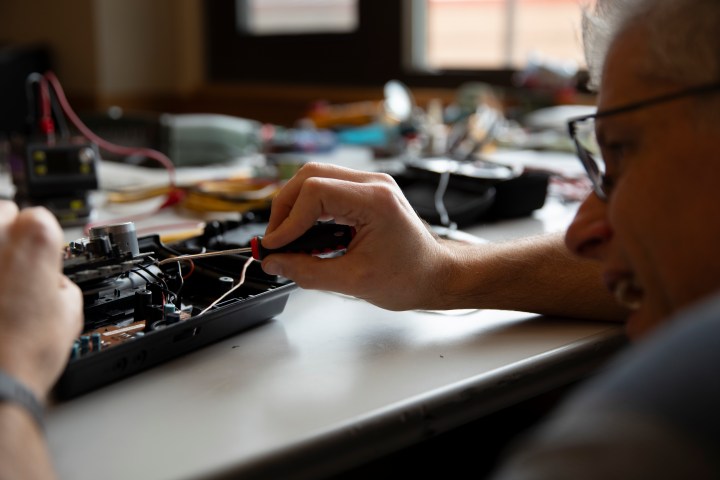
In California and beyond, the right-to-repair movement picks up speed
In California and beyond, the right-to-repair movement picks up speed

We’ve all been there before. A beloved home appliance like a toaster or a blender just stops working. Then we have a choice: throw it away and buy a new one, or try to fix it.
If you choose the latter option, there’s a growing community of people dedicated to helping you get your blender spinning again.
They meet at Fixit Clinics, part of the right-to-repair movement. These pop-up events connect people and their broken items with people who are handy and may be able to help.
At a recent Fixit Clinic in the back of a library in the Northern California town of Redwood City, dozens of people were bent over small appliances, surrounded by tools.
As people seeking help arrived, Peter Mui, the founder of Fixit Clinic, greeted them at the door, held their items aloft and announced their broken devices to the room.
“OK, our first victim!” Mui yelled, “Everyone say hi to Nancy and her Magic Bullet blender.”
Nancy Harris drove 25 miles to get there with her Magic Bullet blender. It had a problem. After she plugged it in, she couldn’t get it to turn off. When this same thing happened with past blenders, she just threw them away.
“I’m so tired of buying a new one, I would love to fix this,” Harris said.
Volunteer Alex Schmitt works in software, but said he likes to tinker. He quickly diagnosed the problem. Mainly, it just needed to be cleaned. The pair also made a little … discovery.
“There are actual bugs inside the motor. Little crawling bugs,” Harris said.
After about an hour of work, and some bug removal, the blender was as good as new. Harris was overjoyed.
“I don’t have to buy a new Magic Bullet! So that saves you what? $100, $200 every couple of years when this happens again. I’m really, really, really happy about it,” she said.
Fixit Clinics are basically classrooms where people learn critical thinking and troubleshooting skills through repair. But they’re also designed to get people to think about how their buying habits affect the environment. By repairing what they have instead of buying something new, consumers can reduce waste and their carbon footprints.
Mui held the first one in 2009 and continues to organize the clinics today. “Fixit Clinic is a hobby of mine that’s gotten way out of control,” he said.
He said people have brought in broken washing machines, a dysfunctional Geiger counter, even a backpack designed to carry a parrot.
“It’s like improv. You never know what the general public is going to present you with,” said Mui.
Mui said around 200 Fixit Clinics were held across the U.S. last year. There’s also an international community on the social platform Discord.
“And we want to propagate these skills and that ethos throughout the entire world,” said Mui.
In July, a new law goes into effect in California, making it the sixth state in the nation to put a right-to-repair law on the books. The California law requires manufacturers of appliances or electronics to make the tools, parts and information necessary to repair their products available to anyone. Companies like iFixit, an online repair community that sells parts and tools, stand to benefit. It co-sponsored the law.
“I think a lot of people are fed up with disposable culture,” said Liz Chamberlain, iFixit’s director of sustainability. “They’re fed up with the idea that you have to buy a new phone every year and buy a new refrigerator every three years. It’s a waste.”
Chamberlain said the California law has already had a national impact. Apple said it would comply across the U.S., not just in the state. And more recently, Samsung broadly expanded its self-repair program for its phones, tablets and PCs. Right-to-repair legislation is also under consideration in nearly two dozen states.
That’s good news for the Fixit Clinic in Redwood City. Each time something was successfully repaired, everyone celebrated with a group cheer.
That’s a feeling you can’t buy.
There’s a lot happening in the world. Through it all, Marketplace is here for you.
You rely on Marketplace to break down the world’s events and tell you how it affects you in a fact-based, approachable way. We rely on your financial support to keep making that possible.
Your donation today powers the independent journalism that you rely on. For just $5/month, you can help sustain Marketplace so we can keep reporting on the things that matter to you.

















